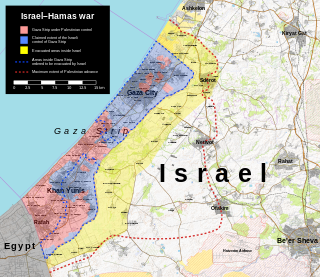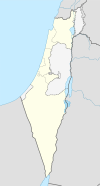
A human shield is a non-combatant who either volunteers or is forced to shield a legitimate military target in order to deter the enemy from attacking it.

Palestinian political violence refers to actions carried out by Palestinians with the intent to achieve political objectives that can involve the use of force, some of which are considered acts of terror, and often carried out in the context of the Israeli–Palestinian conflict and the Israeli occupation. Common objectives of political violence by Palestinian groups include self-determination in and sovereignty over Palestine, or the "liberation of Palestine" and recognition of a Palestinian state, either in place of both Israel and the Palestinian territories, or solely in the Palestinian territories. This includes the objective of ending the Israeli occupation. Some of the factions have called for the destruction of the state of Israel. More limited goals include the release of Palestinian prisoners or the Palestinian right of return.

The 2006 Gaza–Israel conflict, known in Israel as Operation Summer Rains, was a series of battles between Palestinian militants and the Israel Defense Forces (IDF) during summer 2006, prompted by the capture of Israeli soldier Gilad Shalit by Palestinian militants on 25 June 2006. Large-scale conventional warfare occurred in the Gaza Strip, starting on 28 June 2006, which was the first major ground operation in the Gaza Strip since Israel's unilateral disengagement plan was implemented between August and September 2005.
The Gaza–Israel conflict is a localized part of the Israeli–Palestinian conflict beginning in 1948, when 200,000 Palestinians fled or were expelled from their homes, settling in the Gaza Strip as refugees. Since then, Israel has fought 15 wars against the Gaza Strip. The number of Gazans reportedly killed in the most recent 2023 war — 34,000 — is higher than the death toll of all other wars of the Arab-Israeli conflict.

The Gaza War, also known as Operation Cast Lead, also known as the Gaza Massacre, and referred to as the Battle of al-Furqan by Hamas, was a three-week armed conflict between Gaza Strip Palestinian paramilitary groups and the Israel Defense Forces (IDF) that began on 27 December 2008 and ended on 18 January 2009 with a unilateral ceasefire. The conflict resulted in 1,166–1,417 Palestinian and 13 Israeli deaths. Over 46,000 homes were destroyed in Gaza, making more than 100,000 people homeless.
Incidents in the Gaza War include incidents involving attacks against civilians, a school, a mosque, and naval confrontations.
Al-Shifa Hospital was the largest medical complex and central hospital in the Gaza Strip, located in the neighborhood of northern Rimal in Gaza City.

Since 2001, Palestinian militants have launched tens of thousands of rocket and mortar attacks on Israel from the Gaza Strip as part of the continuing Israeli–Palestinian conflict. The attacks, widely condemned for targeting civilians, have been described as terrorism by the United Nations, the European Union, and Israeli officials, and are defined as war crimes by human rights groups Amnesty International and Human Rights Watch. The international community considers indiscriminate attacks on civilian targets to be illegal under international law. Palestinian militants say rocket attacks are a response to Israel's blockade of Gaza, but the Palestinian Authority has condemned them and says rocket attacks undermine peace.
Accusations of violations regarding international humanitarian law, which governs the actions by belligerents during an armed conflict, have been directed at both Israel and Hamas for their actions during the 2008–2009 Gaza War. The accusations covered violating laws governing distinction and proportionality by Israel, the indiscriminate firing of rockets at civilian locations and extrajudicial violence within the Gaza Strip by Hamas. As of September 2009, some 360 complaints had been filed by individuals and NGOs at the prosecutor's office in the Hague calling for investigations into alleged crimes committed by Israel during the Gaza War.

The 2014 Gaza War, also known as Operation Protective Edge, and Battle of the Withered Grain, was a military operation launched by Israel on 8 July 2014 in the Gaza Strip, a Palestinian territory that has been governed by Hamas since 2007. Following the kidnapping and murder of three Israeli teenagers in the West Bank by Hamas-affiliated Palestinian militants, the Israel Defense Forces (IDF) initiated Operation Brother's Keeper, in which some 350 Palestinians, including nearly all of the active Hamas militants in the West Bank, were arrested. Hamas subsequently fired a greater number of rockets into Israel from the Gaza Strip, triggering a seven-week-long conflict between the two sides. It was one of the deadliest outbreaks of open conflict between Israel and the Palestinians in decades. The combination of Palestinian rocket attacks and Israeli airstrikes resulted in over two thousand deaths, the vast majority of which were Gazan Palestinians. This includes a total of six Israeli civilians who were killed as a result of the conflict.
Aside from its use of political violence in pursuit of its goals, the Palestinian political and military organization Hamas has been widely criticised for a variety of reasons, including its alleged use of hate speech by its representatives, alleged use of human shields and child combatants as part of its military operations, alleged restriction of political freedoms within the Gaza Strip, and alleged human rights abuses.

The Wehda Street airstrikes, known in Palestine as the Wehda Street massacre, took place on May 16, 2021, when Israeli forces bombed al-Wehda Street, a densely populated area located in one of Gaza's most prominent residential and commercial neighbourhoods. The bombardment was the single deadliest operation in an 11-day conflict between Israel and Gaza that erupted after weeks of turmoil in East Jerusalem. Some 44 Palestinian civilians died and approximately 50 were injured in the strike, the heaviest of many that, in exchanges between the IDF and Gaza militants, left 2500 Palestinians homeless, and displaced tens of thousands.
The year 2023 in Israel was defined first by wide-scale protests against a proposed judicial reform, and then by the Hamas-led attack on Israel on October 7, which led to a war and to Israel invading the Gaza Strip.
Events in 2023 in the Palestinian territories.

On 27 October 2023, Israel launched an invasion of the Gaza Strip with the stated goals to destroy Hamas, a military and political movement that led an attack on Israel earlier in the month, and to free hostages it took. The effort is ongoing. Before the invasion, dubbed Operation Swords of Iron, Israel declared war, tightened its blockade, and ordered the evacuation of the northern Gaza Strip.

Since the start of the Israel–Hamas war on 7 October 2023, the UN Human Rights Council has identified "clear evidence" of war crimes by both Hamas and the Israel Defense Forces. A UN Commission to the Israel–Palestine conflict stated that there is "clear evidence that war crimes may have been committed in the latest explosion of violence in Israel and Gaza, and all those who have violated international law and targeted civilians must be held accountable." On 27 October, a spokesperson for the OHCHR called for an independent court to review potential war crimes committed by both sides.
Since 2005, Israel Defense Forces have launched thousands of airstrikes on the Gaza Strip from Israel as part of the continuing Gaza–Israel conflict. The airstrikes, widely condemned for targeting civilians, have been described as war crimes by the United Nations, human rights groups Amnesty International and Human Rights Watch. The international community considers indiscriminate attacks on civilian targets to be illegal under international law. Israel says the airstrikes are a response to the rocket attacks by Palestinian militants.
Many countries, including Israel has accused Hamas of using human shields in the Gaza Strip, saying that Hamas has purposely attempted to shield itself from Israeli attacks by storing weapons in civilian infrastructure, launching rockets from residential areas, and telling residents to ignore Israeli warnings to flee. Israel has also accused Hamas of maintaining command and control bunkers and tunnel infrastructure below hospitals.
The accusation of the use of human shields is a common theme in the Israeli–Palestinian conflict. Both the Israel Defense Forces (IDF), and Palestinian terrorist groups have used civilians as human shields to discourage the opposing side from attacking. Many activists have often voluntarily used themselves as human shields to stop Israeli violence against Palestinians: these include the International Solidarity Movement, and Israeli leftists.
During the Israel–Hamas war, Israel and the United States stated that a vast complex existed under al-Shifa hospital that was being used by Hamas as its "main operations base", which Hamas and hospital administrators denied. Following Israel's release of video evidence on 22 November, multiple news agencies concluded that the evidence did not demonstrate the use by Hamas of a command center. The New York Times also said the evidence does not show conclusive evidence of a vast network of tunnels, while Haaretz concluded that Hamas did use the hospital for military purposes. Amnesty International said on 23 November 2023 that "Amnesty International has so far not seen any credible evidence to support Israel’s claim that al-Shifa is housing a military command centre" and that "the Israeli military has so far failed to provide credible evidence" for the allegation. Izzat al-Risheq, a Hamas official, denied that the group used the hospital as a shield for its underground military structures, saying there was no truth to the claims.
















